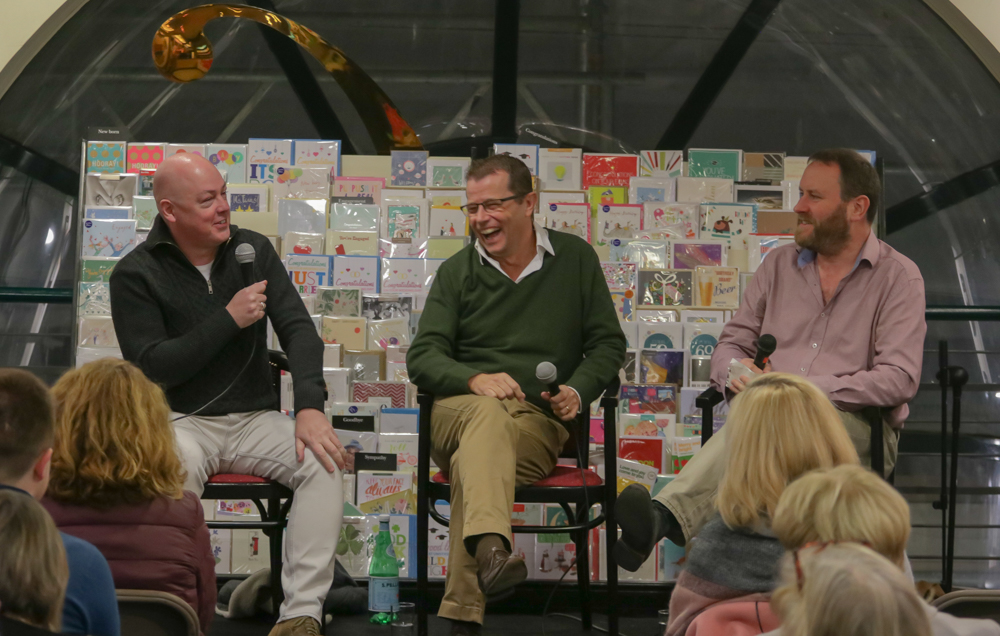
Upstairs in Hodges Figgis, listening to a piano melody while sitting between the gardening and cookery sections, I felt bemused by the music and disheartened by the thought that the gardening section is probably larger than the classics section downstairs. I was preparing myself for an enlightening discussion on the topic of “books” with John Boyne and Paul Howard, best known for the Ross O’Carroll-Kelly books – and enlightening it certainly was. Together, Boyne and Howard managed to discuss everything from the failures of the Catholic Church to Gerry Adams and eavesdropping on conversations on the 46a for the sake of art.
The two authors began by discussing the literature that influenced them in their young, formative years. Howard recalled that the first book he had ever owned was a book of biblical stories for children. Anyone who has read the Ross O’Carroll Kelly books can surely attest to the biblical influence in them. Howard remembered having his book signed by his local priest at the time, adding with a devilish twinkle in his eye, that “it was probably the last thing that he ever signed as a priest, because soon after that he ran away with his maid and was defrocked or whatever you call it”.
George Orwell once wrote that working in a bookshop quelled his love of books as it made him realise the “rarity of really bookish people”. Boyne, however, recalled his time working in Waterstones more fondly, remembering how it allowed him to meet writers such as Colm Tóibín and even John McGahern while also telling a few more humorous stories. “I must have been hungover”, Boyne began, and “a customer came up to me while I was working in the travel section. He wanted something on cruising. I looked at him rather blankly before realizing what he was on about. ‘Our gay and lesbian section is downstairs’, I told him. He stared at me for some time before shouting ‘BOATS’”.
Boyne also recalled the day when Gerry Adams was in Waterstones doing a book signing. There were queues out the door. Boyne’s manager told him that Adams only wanted to do another 40 signings and Boyne was to inform the crowd. Boyne’s news was greeted by groans and protests by the rambunctious, queuing Sinn Féiners and so Boyne fired back, unintentionally provocative, with “I’m sorry but Gerry is the one calling the shots here”. Boyne went red as he delivered this punchline but his audience found it hilarious.
A mischievous grin spread across Howard’s face as he remembered his first book signing. There he was, signing copies of The Curious Incident of the Dog in the Night-Dress, when an enthusiastic fan came up telling him how much she loved it. She had read the novel twice already. Howard was impressed, as the novel had only been out for three days at this stage. Her voice became earnest when she asked: “How do you understand autism so well?” Of course, Howard doesn’t understand autism all that well because he is not Mark Hadden. But on the phone to this excited woman’s husband, Howard pretended that yes, he did understand autism that well, so as not to embarrass her.
As the evening drew to a close, the discussion turned to the current state of literature. Neither writer seemed particularly worried about it. Boyne reserved specific praise for Donal Ryan’s The Spinning Heart, describing it as the one book he wishes he could have written. Boyne also mentioned his monthly book review in the Irish Times, for which he gets to pick the books he will review. He exclusively chooses books by “authors I like, or books that I think I’ll like. I want to praise the book and encourage people to read. Why would you want to dissuade people from reading?”. His words brought a smile to the faces of all the bookworm attendees.
And with that, an evening of hilarity was over and I left Hodges Figgis with a skip in my step, perhaps a little more optimistic than when I first entered and saw that unfathomably long row of books that lay beneath the title “gardening”.






